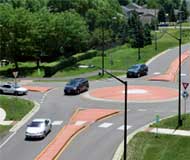7/29/2020
Colorado Court Rejects Use Of Turn Signals In RoundaboutsColorado becomes the third state where courts have rejected the requirement to signal a turn when driving through a roundabout.

Traffic laws are often made in cases brought against motorists accused of drug-related crimes. In Colorado, for example, the state Court of Appeals last week decided that motorists do not have to use their turn signals when entering a roundabout. For this clarification, Colorado motorists can thank Timothy R. McBride, who had parked his Lincoln Town Car for a few minutes in the lot of a hotel that was under surveillance for a drug bust.
Deputies involved in the surveillance claimed that they ordered McBride to pull over because he had a patched tail light and he drove through a roundabout without using his turn signal. The question before the three-judge appellate panel is whether the traffic stop was legal.
Under Colorado law, a driver may not "turn a vehicle" or "move right or left" on the road without signaling one hundred or two hundred feet before the turn. The law is silent about whether that applies to roundabouts, which requires drivers to move right or left on the road. In 2017, a state lawmaker introduced a bill that would have explicitly stated no signal was needed, but the legislation went nowhere. The court noted that judges in Alaska (in the case Noble v. Alaska) and Indiana (Indiana v. Davis) had also considered the question and rejected the idea that drivers should be ticketed for not signaling on the way into or out of a roundabout.
"We find the analysis in Noble and Davis persuasive and conclude for the same reasons that section 42-4-903 does not apply to motorists entering or exiting a roundabout," Judge Christina F. Gomez wrote for the three-judge Colorado panel. "The Noble court remarked that the required signaling distance of 100 feet can't readily be applied to roundabouts, where entrances and exits are often less than 100 feet apart. As a result, signaling for that length of time at a roundabout could be confusing and potentially dangerous. This concern similarly applies to Colorado..."
Despite the ruling, McBride will not go free. A jury had previously acquitted the man of methamphetamine possession charges but found him guilty as a felon in possession of a handgun. The appellate court upheld that conviction because the tail light charge constituted a sufficient justification for the traffic stop.
A copy of the ruling is available in a 250k PDF file at the source link below.


